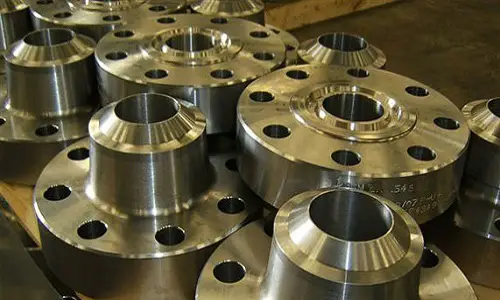The alloy steel screwed flanges have a ferritic structure and minor amounts of secondary elements like iron, vanadium, silicon, etc. are present. The alloy's heat resistance and corrosive property are enhanced by the major component, chromium. Nickel aids in the alloy's stability and hardening under pressure. The alloy steel threaded flanges' ability to function at temperatures below the norm can be attributed to nickel. The flange is resistant to heat and wear and tear due to the metal cobalt in its composition, making it suited for use in demanding circumstances.
Features of Alloy Steel Threaded Flanges
Corrosion makes operating in an oxidizing environment difficult, although alloy steel threaded/screwed flanges can tolerate the oxidation and perform adequately in such circumstances. These alloy-threaded steel flanges can also withstand higher temperatures without losing any of their durability or functionality. The alloy screwed flanges are stronger and more resilient in high temperatures because of their head-hardening characteristics. The alloy steel flanges are effective in high-pressure situations due to their outstanding ductility.
Another feature of the alloy flange under consideration is its resistance to acid corrosion. The endlessly adaptable alloy steel threaded flanges are used in a variety of industries, including the pulp and paper industry, oil refineries, petrochemical plants, energy production facilities, breweries, refineries, heat exchangers, pharmaceuticals, and chemical equipment.
Specifications of AS Threaded Flanges
- Specifications: ASTM A182 / ASME SA182
- Dimensions: ANSI/ASME B16.5, B16.47 Series A & B, B16.48, BS4504, BS 10, EN-1092, DIN, etc.
- Standard: ANSI Flanges, ASME Flanges, BS Flanges, DIN Flanges, EN Flanges, etc.
- Size: 1/2″ (15 NB) to 48″ (1200NB)
- Class / Pressure: 150#, 300#, 600#, 900#, 1500#, 2500#, PN6, PN10, PN16, PN25, PN40, PN64 etc.
- Flange Face Type: Flat Face (FF), Raised Face (RF), Ring Type Joint (RTJ)
Steel Alloy Forged Precipitation-hardened steel is used in threaded flanges because it offers high strength and hardness, great fatigue qualities, good corrosion resistance, good formability, and minimal distortion after heat treatment. For its yield strength and hardness range, alloy steel F11 threaded flanges have good formability.
For more information visit Alloy Steel A182 F11 Flanges Manufacturer






